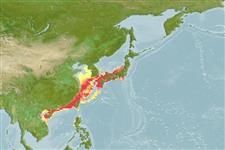>
Eupercaria/misc (Various families in series Eupercaria) >
Haemulidae (Grunts) > Plectorhinchinae
Etymology: Parapristipoma: Greek, para = the side of + Greek, pristis = saw + Greek, poma = operculum (Ref. 45335).
Environment: milieu / climate zone / depth range / distribution range
पारिस्थितिकी
समुद्री बेनथोपिलाजिक; औशिनोड़िरोमस. Subtropical; 39°N - 15°N, 105°E - 140°E
Indo-West Pacific: southern Japan, East China Sea and Taiwan.
Length at first maturity / आकार / वज़न / Age
Maturity: Lm 18.0, range 16 - 20 cm
Max length : 40.0 cm SL पुल्लिंग / अलिंग; (Ref. 559); अधिकतम प्रकाशित वज़न: 1.1 kg (Ref. 40637)
Cultured and released for fishery in Japan. The species prefers relative warm water, high salinity, and rocky shores. The species does seasonal offshore-inshore migrations in limited areas (Ref. 34104).
Oviparous, distinct pairing during breeding (Ref. 205). A couple ascends quickly to the surface and spawns (Ref. 34104).
Masuda, H., K. Amaoka, C. Araga, T. Uyeno and T. Yoshino, 1984. The fishes of the Japanese Archipelago. Vol. 1. Tokai University Press, Tokyo, Japan. 437 p. (text). (Ref. 559)
IUCN Red List Status (Ref. 130435)
Threat to humans
Harmless
Human uses
मात्स्यिकी: व्यापारिक
अधिक जानकारी
संदर्भजलीयकृषिजलीयकृषि रूपरेखाखींचआनुवंशिकीElectrophoresesहैरेटिबिलटीबीमारीप्रक्रमणNutrientsMass conversion
सहयोगीयोतस्वीरेStamps, Coins Misc.ध्वनिसिगुयटिरारफ्तारतैरने के प्रकारगिल क्षेत्रOtolithsदिमागदृष्टि
साधन
Special reports
Download XML
इंटरनेट स्रोत
Estimates based on models
Preferred temperature (Ref.
123201): 18.2 - 26.6, mean 24.1 °C (based on 168 cells).
Phylogenetic diversity index (Ref.
82804): PD
50 = 0.5625 [Uniqueness, from 0.5 = low to 2.0 = high].
Bayesian length-weight: a=0.00933 (0.00555 - 0.01568), b=3.01 (2.86 - 3.16), in cm total length, based on LWR estimates for this species & (Sub)family-body (Ref.
93245).
Trophic level (Ref.
69278): 3.4 ±0.45 se; based on food items.
लौटाव (Ref.
120179): माध्यम, न्यूनतम जनसंख्या दुगनी होने का समय 1.4 - 4.4 वर्ष। (K=0.25-0.35; tm=2; Fec=30,083).
Fishing Vulnerability (Ref.
59153): Moderate vulnerability (36 of 100).
Nutrients (Ref.
124155): Calcium = 63.2 [13.8, 129.8] mg/100g; Iron = 0.987 [0.507, 1.843] mg/100g; Protein = 18.4 [16.5, 20.2] %; Omega3 = 0.33 [0.16, 0.59] g/100g; Selenium = 27.9 [14.4, 54.5] μg/100g; VitaminA = 28.1 [10.6, 75.8] μg/100g; Zinc = 0.795 [0.567, 1.126] mg/100g (wet weight);
